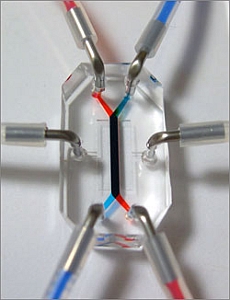The Wyss Institute for Biologically Inspired Engineering at Harvard University in Massachusetts and Sony Corporation’s optical media division (Sony DADC) will collaborate on developing plastic chips that emulate human organs. Financial terms and timetable of the deal were not disclosed.
Chips that emulate human organs are made of clear, flexible polymer plastic, about the size of a flash memory stick, having microfluidic channels lined with living human cells. These organ-on-chip devices make it possible to simulate and observe living cellular functions in real time. Development of these chips can allow preclinical drug testing under more controlled conditions, without the use of lab animals. They can also be used to test for potential harmful effects in chemicals or cosmetics.
NIH says more than 30 percent of promising medications failed when found to be toxic in human clinical trials, despite promising preclinical studies that test the compounds on animals. Organ-on-chip devices, which are a newer human cell-based approach, may help researchers better predict how effective a therapeutic candidate would be in clinical studies.
In July 2012, National Institutes of Health (NIH), with Food and Drug Administration and Defense Advanced Research Projects Agency, announced $70 million in funding for 17 research initiatives to develop organs-on-chips, including a grant to the Wyss Institute. Ten of the projects are building chips emulating organs, while the other seven studies are exploring stem and precursor cells that differentiate into multiple cell types as a source of tissue cells to populate the devices.
In March 2012, Wyss Institute researchers published a paper describing a “gut-on-a-chip” that emulates a human intestine. The device (pictured at top) has a central chamber with a layer of human intestinal epithelial cells growing on a porous membrane substrate that recreates the intestinal barrier. The flexible membrane attaches to side walls that stretch and recoil with the aid of an attached vacuum controller. The institute says it is working on nine other organ-on-chip devices.
Sony DADC builds devices and systems for optical media, such as CDs and DVDs, but has branched into microstructured polymer devices for life science and in-vitro diagnostics. The company plans to bring its expertise on manufacturing to the partnership.
Read more:
- Trial Tests Tablet App to Assess Neuromuscular Performance
- Modeling, Biotechnology Boost Antibiotic Impact on Pathogens
- NIH to Fund Development of Organ-On-Chip Devices
- Micro Lab Device Developed That Simulates Human Intestine
- Natural Lightweight Material Exhibits Strength, Toughness
* * *


 RSS - Posts
RSS - Posts
[…] Harvard Institute, Sony to Partner on Organs-on-Chips […]